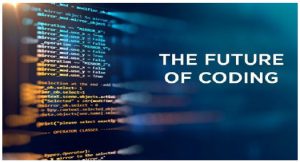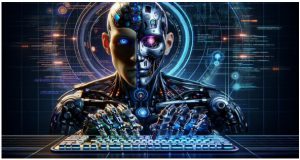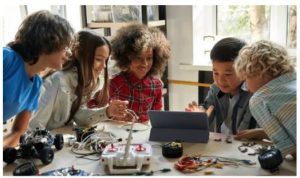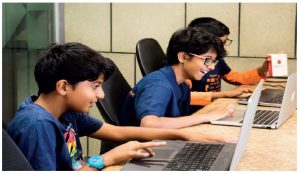Why AI Won’t Replace But Rather Empower Coders: A Look at the Future of Programming (Illustrated Edition)
The headlines might scream “Coding’s End is Near! AI to Take Over!” But before you start panicking about your coding career, take a deep breath. Here’s the truth: AI won’t replace coders altogether, it will fundamentally change the way we code.

From Headlines to Reality:
Imagine a world where robots write novels, design skyscrapers, and solve complex mathematical problems – all autonomously. Sounds like science fiction, right? Well, not entirely. Artificial intelligence (AI) is already making waves in various fields, including coding. However, the fear-mongering headlines claiming AI will replace all coders are misleading. Let’s debunk the hype and dive into the nuanced reality:
AI’s Strengths and Limitations:
Impressive Feats, Not Full Replacements:
ChatGPT’s Exam Prowess: While ChatGPT’s ability to pass a software developer exam is impressive, it doesn’t mean it can design entire systems, understand user needs, or navigate complex ethical questions. Think of it like a student who aces standardized tests but struggles with critical thinking and real-world application. Human developers still hold the edge in creativity, strategic thinking, and holistic problem-solving.

AlphaCode’s Competitive Edge: AlphaCode’s performance against programmers shows that AI can excel in specific tasks. However, the competition was limited to solving predefined coding challenges. Real-world projects involve constant adaptation, collaboration, and unforeseen difficulties. Here, human adaptability and experience trump AI’s rule-based approach.
Collaboration, Not Competition:
Instead of fearing AI as a replacement, envision it as a powerful collaborator.
Imagine AI handling repetitive tasks like:
➢ Generating boilerplate code (think standard functions and data structures)
➢ Fixing common bugs (based on established patterns and error logs)
➢ Automating documentation (using natural language processing to summarize code)
This would free up developers to focus on:
➢ Designing innovative solutions
➢ Solving complex problems that require human judgment and creativity
➢ Leading and managing teams
This human-AI partnership, where each leverages their strengths, will unlock tremendous potential in the coding world.

Why Your Kids Should Still Learn to Code:
Essential Skills Beyond Coding:
Learning to code isn’t just about writing lines of code. It cultivates essential skills that benefit everyone, regardless of their career path:
Problem-solving: Breaking down complex challenges into manageable steps is a valuable skill in any field.
Logical thinking: Coding teaches you to think critically and systematically, a skill applicable to everyday life.
Computational thinking: Understanding how computers work and solving problems algorithmically is a valuable asset in today’s technology-driven world.
AI Literacy is Key:
Even if someone doesn’t code professionally, understanding how AI works and interacts with code will be crucial for navigating the future. Imagine a world where AI writes marketing copy, analyzes medical data, or even creates art. Being able to understand and collaborate with these AI tools will be essential for success.
Human-AI Synergy is the Real Power:
The future belongs to those who can effectively collaborate with AI. Learning to code equips you to be a powerful partner, not a replaceable cog. Imagine a developer who:
✓ Understands AI capabilities and limitations
✓ Can communicate effectively with AI tools
✓ Knows how to leverage AI to augment their own skills
Such individuals will be in high demand and drive innovation across various industries.

How AI Will Empower Coders:
AI as the Supercharged Assistant:
Think of AI as a supercharged assistant, taking care of the tedious and repetitive tasks:
Automated code generation: AI can generate entire sections of code based on user specifications, saving developers time and effort. (Imagine AI generating the backend code for a simple mobile app based on your wireframes and user flow ideas.)
Faster learning and higher productivity: AI tools like Copilot can suggest optimal code snippets and automate repetitive tasks, allowing developers to learn faster, work more efficiently, and get more done.
Accessibility for all: No-code and low-code platforms powered by AI democratize coding, allowing individuals with no prior experience to build applications and solutions. (Imagine a small business owner creating a customer portal using a drag-and-drop interface powered by AI.)
The Future of Collaboration:
AI handles:
➢ Repetitive tasks (boilerplate code, bug fixing, documentation)
➢ Data analysis and pattern recognition
➢ Optimization and efficiency improvements
Humans bring:
➢ Creativity and strategic thinking
➢ Problem-solving and adaptation
➢ Communication and Collaboration
➢ Ethical considerations
The Future of Collaboration: A Symbiotic Partnership
Humans and AI: Stronger Together
Imagine a world where developers work alongside AI companions, each playing to their strengths. This harmonious collaboration will propel the coding landscape forward in exciting ways:
Unlocking Unprecedented Innovation:
Tackling complex challenges: Together,humans and AI can tackle challenges in healthcare, sustainability, and beyond, with AI analyzing vast datasets and humans providing creative solutions. (Imagine AI identifying potential drug targets while developers design virtual simulations to test those targets.)
Accelerated problem-solving: AI can sift through mountains of data to identify patterns and potential solutions, while humans provide the necessary context and judgment to refine those solutions. (Imagine AI analyzing traffic patterns and suggesting potential congestion solutions, while urban planners weigh feasibility and community impact.)
Democratizing innovation: No-code and low-code platforms powered by AI empower individuals and small teams to tackle challenges once reserved for large corporations. (Imagine a community group using AI-powered tools to design and build a local sustainability project.)

Evolving Skillsets for Thriving in the AI Era:
While AI won’t replace coders, it will undoubtedly reshape the skillset landscape. To thrive in this future, developers will need to:
Embrace continuous learning: The pace of technological advancement will necessitate staying up-to-date with AI advancements and emerging tools.
Deepen problem-solving and critical thinking: While AI might suggest solutions,humans will need to assess their feasibility,ethical implications, and real-world impact.
Master communication and collaboration: Effective communication with AI tools and collaboration with diverse teams will be key to success.
Develop a human-centric approach: Understanding user needs, designing ethical solutions, and ensuring responsible AI integration will be crucial.
A Shared Journey: Embracing the Future with Optimism
The rise of AI isn’t a threat to coders; it’s an opportunity for advancement. By embracing this technological shift, developers can unlock their full potential, collaborate with powerful AI tools, and co-create a future filled with innovation and positive impact. Remember, the future belongs not to humans or AI alone, but to the remarkable things they can achieve together.
Remember, this is just the beginning! This blog post serves as a springboard for further exploration. Dive deeper into specific examples of how AI is already empowering coders in various industries. Research emerging AI tools and platforms, and experiment with how they can enhance your workflow. Share your experiences and insights with the community, fostering a collaborative spirit that fuels the future of coding.
Together, let’s shape a future where humans and AI work hand-in-hand, pushing the boundaries of what’s possible and creating a better world for all.
 Dr K. Jayanth Murali is a retired IPS officer and a Life Coach. He is the author of four books, including the best-selling 42 Mondays. He is passionate about painting, farming, and long-distance running. He has run several marathons and has two entries in the Asian book of Records in full and half marathon categories. He lives with his family in Chennai, India. When he is not running, he is either writing or chilling with a book.
Dr K. Jayanth Murali is a retired IPS officer and a Life Coach. He is the author of four books, including the best-selling 42 Mondays. He is passionate about painting, farming, and long-distance running. He has run several marathons and has two entries in the Asian book of Records in full and half marathon categories. He lives with his family in Chennai, India. When he is not running, he is either writing or chilling with a book.
